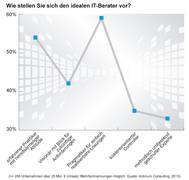09.09.2013
IT consultant: the pragmatist with an eye for easy-to-implement solutions is in demand
Not even one in two user companies is completely satisfied with the performance of the IT consultants they use, and they particularly call for less complicated concepts. In addition, according to a survey by Actinium Consulting, consultants should take on more responsibility for results. As an ideal IT consultant, they envision the pragmatist with an eye for easy-to-implement solutions.
When asked how satisfied they usually are with external IT experts, just under half of the nearly 300 medium-sized and large companies surveyed gave a positive verdict. However, only 17 percent are consistently very satisfied, while 30 percent complain of very fluctuating or predominantly poor results. The main reasons may include the fact that consultants too seldom assume concrete responsibility for results and often take too complicated a route. At the very least, about two-thirds of the IT managers surveyed see a need for optimization among consultants in this area. At the same time, the majority of them criticize the fact that consultants often lack an eye for more economical approaches to solutions and do not always understand customer thinking sufficiently. More than half are also disappointed by the innovation transfer that many user companies expect from the use of external consultants. They also expect more actual best practices to be brought into consulting projects.
This range of requirements is also reflected in the image of the ideal consultant that the Actinium survey questioned. In the opinion of most IT managers, he should distinguish himself as a pragmatist with a focus on solutions that are easy to implement (59 percent), but for a similar number he can also be the experienced practitioner with a somewhat shirt-sleeved attitude. Visionaries, on the other hand, are less in demand, even if they are characterized by their view of future requirements. Consultants with a pronounced controller mentality, who are in the mood for the most cost-efficient project implementation possible, are also preferred by only a third of those surveyed. There are similar reservations about IT consultants with comprehensive methodological training, because IT managers may have experienced that they are too theory-heavy in their approaches.
“It seems that IT consultants are full of ideas, and that they are too much of a theory-lover.
“Apparently, a clear change is currently taking place in the market, with companies increasingly focusing on very problem-focused solutions that can be implemented quickly,” Actinium CEO Klaus Hüttl interprets the survey results. “The clock is ticking faster and faster in terms of user requirements, which is why solutions must be free of overhead and implementable as quickly as possible, because the requirements in IT support can look different again just one year later,” he emphasizes. The ever-shorter change cycles create the need to take a more pragmatic approach to projects and generate benefits quickly. At its core, this is about simpler implementation concepts, he stresses.
“For a long time, the word simplicity had a negative reputation because it was equated with undemandingness and lower quality. In fact, however, solutions that are kept as simple as possible actually conceal higher conceptual requirements, since they must lead to the same result with less effort,” Hüttl emphasizes, citing Apple’s products as an example. “The iPhone has demonstrated how smartphone operation can be significantly simplified, and simplification is an expression of intelligent technological innovation.” He adds that IT consulting must make this its model in order not to develop past the needs of its customers.



